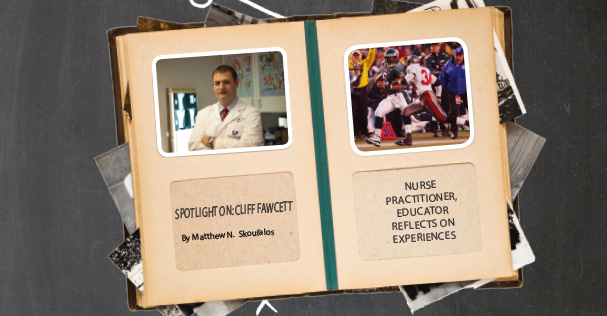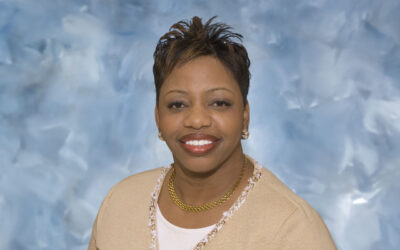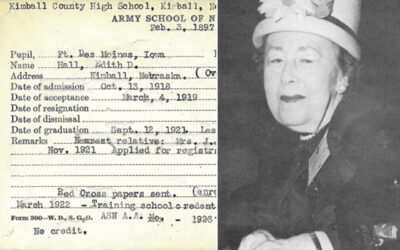By Matthew N. Skoufalos
Board-certified family nurse practitioner Cliff Fawcett, MED, MSN, took a long time to get right back to where he started: his alma mater of Cedarville University in Cedarville, Ohio.
Fawcett’s father (and namesake) taught business management at Cedarville University for 25 years, starting when he was a freshman at Cedarville. His brother, Jeff, spent another 24 teaching business marketing at the university. Then, in 2010, Cliff joined the Cedarville faculty — just in time for his son, Andrew, to enter the school’s graphic design program. Four years later, Andrew is ready to graduate, and his younger brother, Ben, is a junior in the Cedarville University School of Business.
Currently, Cliff Fawcett heads the family nurse practitioner program at Cedarville. He describes the career he’s enjoyed in the years since as “very interesting and diverse.” He has earned two master’s degrees — one in sports medicine and one as a family nurse practitioner. He also has spent time working with one of the preeminent team doctors in Philadelphia, Arthur Bartolozzi.
During Fawcett’s tenure with Bartolozzi, the physician was the team doctor for the Philadelphia Flyers and their minor league affiliate, the Phantoms; the Philadelphia Eagles, the Philadelphia Kixx soccer team, the Camden River Sharks, the Philadelphia Rage of the women’s American Basketball League, and for athletics teams from Rowan and West Chester Universities.
“Working with him — and we took care of all those teams — we were in the locker rooms, on the field, right in the thick of it all the time,” Fawcett said.
Fawcett recalls spending weeks with players, evaluating them after game injuries, working them up in the locker room, staying with them through surgery if it was required, and getting them back on the field. He was with the Phantoms during their 1998 American Hockey League Calder Cup victory, and along for the ride when many of the players from that junior team went on to NHL careers with the Flyers. He was also on hand for two years of the X Games in Philadelphia, where he remembers watching legendary skateboarder Tony Hawk land a 900-degree spin for the first time in competition — and riding in the ambulance with Carey Hart after Hart failed the first attempted backflip on a dirt bike.
“[I saw] a lot of those significant historical events in action sports,” Fawcett recalls. “It’s surreal, really. And then I don’t think you realize it so much when it happens, but you watch for years, that replay on ESPN, and I saw it live.”
“It’s not a place that a lot of people have access to, and I just felt really privileged to be there, and honestly, to help these guys,” he said.
Fawcett said he “enjoyed figuring out the differences in personality between the different teams” and had “so many memories of different players being injured,” including a number of borderline professional athletes who never made it past the practice squad yet needed professional care all the same.”
“Working with the Eagles, the casual fan is aware of the Donovan McNabbs and the Brian Westbrooks, Duce Staley, people like that, and we worked with those guys,” Fawcett said; “but we saw a ton of players who most fans have never heard of.”
“There’s a lot of guys that are really, really talented,” he said. “They make it to that level, but they don’t succeed at that level like others. They have needs just as much as those big-name guys.”
Fawcett said that many fans are enamored with the professional athletes, “and I felt like they got enough of that” from their supporters. Where he maintained his professionalism, it mattered to the players because “they needed someone to treat them like a human being,” Fawcett said.
“They have a problem, it’s standing in the way of them making a living,” he said. “You’ve got a UPS driver with a bad back; he needs the right treatment to get back to work to make a living in the same way that a tight end with a bad back does.”
That approach served Fawcett well after his time with Bartolozzi concluded. The doctor stopped working with the pro teams in 2003, and Fawcett stayed with his practice for another five years, working with the Philadelphia Kixx and the collegiate teams. Had it not been for his ability to distance himself from the profile of the work and his clientele, Fawcett said the letdown might have been very difficult to overcome.
“I remember the day that Dr. Bartolozzi resigned from taking care of the Eagles and the Flyers,” Fawcett said. “I thought to myself, what am I going to do? I felt like that gave me credibility that I worked with those people.”
But soon, Fawcett said, he realized that yes, he had done those things, and “no one can take that away from me.”
“Second, I have credibility,” he said. “It’s not that I draw my credibility from the people that I work with.”
“Looking back, my dad always used to say your career forms behind you,” Fawcett said. “Everything seems random, but you look back. You have to take the step that seems to make sense at the time.”
“I think you sometimes put a lot of pressure on yourself to make the right choice,” he said. “It’s not that the choice doesn’t matter. I wouldn’t believe that I would have those opportunities, and I wouldn’t have believed that I would have moved on from those opportunities. It developed fluidly and I don’t regret any of it. It’s all good experience.”










